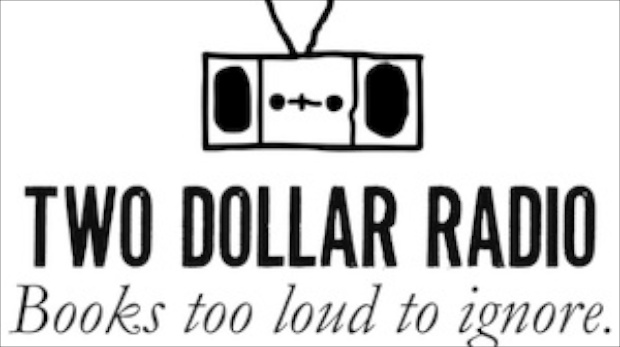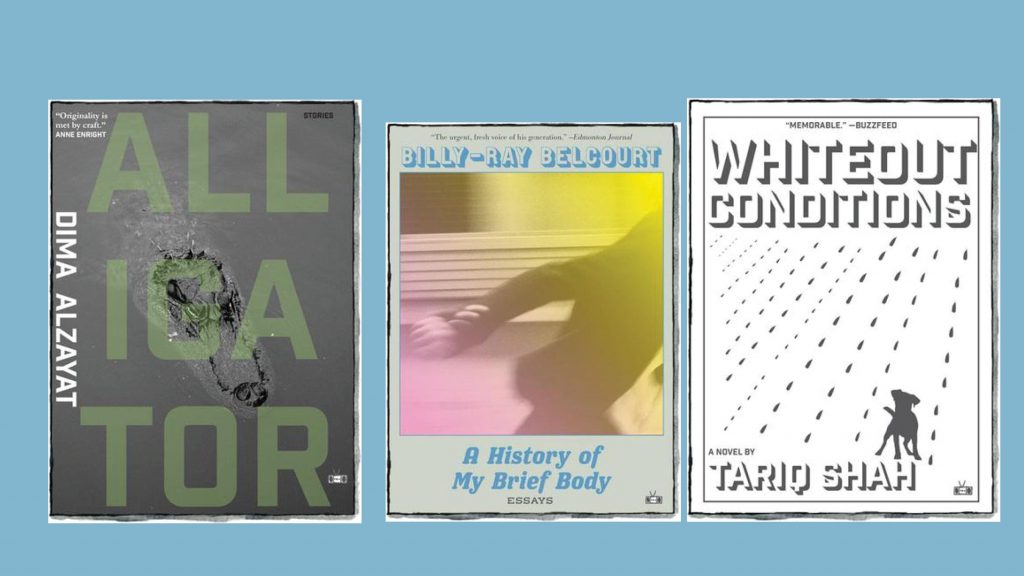Two Dollar Radio is a family-run boutique literary press based in Columbus, Ohio, and they are not here to please everyone. Their website states: “Our work is for the disillusioned and disaffected, the adventurous and independent spirits who thirst for more, who push boundaries and like to witness others test their limits. We know we’re not alone. Let’s make some noise.”
Since its founding in 2005, this feisty small press has produced over 60 books of nonfiction and fiction, including titles such as Hanif Abdurraqib’s They Can’t Kill Us Until They Kill Us, Sarah Rose Etter’s The Book of X, Grace Krilanovich’s The Orange Eats Creeps, and Masande Ntshanga’s Triangulum. Two Dollar Radio’s books have been honored by the National Book Foundation, finalists for the Los Angeles Times Book Prize, picked as “Editors’ Choice” selections by The New York Times Book Review, and made year-end best-of lists at O, The Oprah Magazine, National Public Radio, Slate, Salon, The Believer, and others. They are also the only independent publisher in North America to produce their own films in addition to books.
In this latest installment of our Small Press Series for MQR Online, we chat with the founders of Two Dollar Radio, Eric Obenauf and Eliza Wood-Obenauf, about their press’s mission, their experimental and punk aesthetic, and a few upcoming titles from outstanding Two Dollar Radio authors.

Cameron Finch (CF): Could you tell us about the founding of Two Dollar Radio? What inspired you to start the press, and what was your original mission? What could Two Dollar add to the literary conversation that had not been heard before?
Eliza & Eric: When we co-founded the press, we were a young, idealistic, fiercely independent couple with a love for books. In 2005, we had just finished undergrad in New York City, where Eric had studied screenwriting and Eliza studied art education. We moved to San Diego, and worked service industry jobs and read a lot. During this time, we were beginning to feel disillusioned with contemporary publishing — it was becoming harder to find the books that we were most attracted to, which were mostly bold and quirky literary fiction.
We were reading almost exclusively work from the publisher colophons we had come to trust — Akashic, Soft Skull, Dalkey Archive — and found ourselves going to bookstores, searching spines for their logos rather than authors we were familiar with. We happened upon Andre Schiffrin’s The Business of Books: How the International Conglomerates Took Over Publishing and Changed the Way We Read and were both overwhelmed by the book. In it, Schiffrin charts the ideological shift in publishing from the post-World War II era to the late 1980s, when corporations acquired many of the independent presses and folded them under their umbrella.
A few magical details all clicked into place, and we decided we wanted to start our own family press, focusing on the books we’re most attracted to: bold voices, distinctive, incendiary, and hopefully pushing our literary culture forward as opposed to simply maintaining the status quo.
CF: Editorially speaking, what makes a book a Two Dollar Radio book? What are its necessary ingredients?
Eliza & Eric: Our tagline is: “Books too loud to ignore.” In the work we produce, we value ambition above all, and believe that none of our books crimp to convention when it comes to storytelling or voice. Ideally, that contributes to a liberating reading experience. Our primary interest lies with what we would characterize as bold work: subversive, adventurous, original, and highly creative.
Over the past fifteen years, we have published a wide range of genres from novels and essay collections to short story collections and memoirs, from Acid Westerns and Sci-Fi to Graphic Novels and Dystopia. No matter the genre, we have become known for curating boundary-pushing writers and for our fiercely punk DIY aesthetic.
CF: What does a day in the office look like?
Eliza & Eric: Every single day is a blank slate, where we may have a list of tasks to get done, but anything can happen. Yesterday, for example, the furnace went out in our brick-and-mortar, so everything came to a stop, and fixing it became the day’s duties! Between the two of us and our publicist Molly, we might be reading/editing/copyediting, updating websites, fielding emails, creating lists of contacts for book mailings to generate publicity, talking with or presenting to our distributor/sales team, traveling to book conventions or book fairs, designing a book cover, working with our printer on upcoming book printings, creating or reviewing contracts, etc.
CF: What are the joys and hardships of being a family-run operation?
Eliza & Eric: We started the press in 2005 and had our first child in 2006. The kids are now almost 14 and 10 years old, and, having been immersed in the daily running of the operation their whole lives, there is a huge amount of pride and ownership for them in being a part of it all. Each child has their own job for the press, which evolves as they get older. They see how much time, energy, and attention it takes for us to run the press and our brick-and-mortar, and they also see how fulfilling and rewarding it is for us, so we’re certainly proud to be passing on those values to them.
CF: Can you tell us about Two Dollar Radio’s relationship with bookstores and other literary organizations?
Eliza & Eric: In our latest catalog, we wrote a love letter to indie booksellers: None of what we have accomplished would have been possible without the early and unflinching support of booksellers who championed our books and became great friends in the process. 2008 was the year we first got major distribution. In the fall, the Great Recession hit, and everyone began trumpeting the “death of print.” It’s 2020, and we feel like together we’ve proven that indie bookshops and indie presses aren’t going anywhere!
CF: Every book published at Two Dollar Radio is a thing of beauty—every design bursts with color and borderline unsettling imagery and oh, those satisfying French flaps! How did the press settle on its signature style?
Eliza & Eric: Thank you so much! It took us a couple years to pin down the physical dimensions that we loved the most, and we’ve stuck with that single size for each book. It also took us a couple years to get in a groove with the aesthetics of our cover designs, which quickly became Eric’s bag. For each book, we work with the author up front to establish what we’ll try for, and then all work together with Eric’s designs to pinpoint the perfect cover to represent the book.
CF: Looking ahead, what are your goals for Two Dollar Radio in the coming years? What would you like to maintain, and how do you dream of growing?
Eliza & Eric: We reached a point a couple years back where we could have published more books had we wanted to, but it’s our belief that there are too many books being published and we didn’t want to contribute to this glut of over-saturation. We are pretty deliberate in our approach, so that each book receives our full attention and the best chance to reach readers.
Since 2017, we have organized an annual four-day music, literature, and film festival called Flyover, and run our own brick-and-mortar indie bookstore called Two Dollar Radio Headquarters, which also functions as a bar, coffeehouse, vegan café, and performance space. Both have given us a greater opportunity to enhance and cultivate the exciting growing literary scene in Columbus, Ohio, and allow us to champion not only Two Dollar Radio authors, but indie presses and artists from all over the country.
CF: Can you recommend a few recently published or forthcoming Two Dollar titles we should keep on our radar?
Eliza & Eric: We’ve got a tremendously exciting 2020 lined up, including the second novel by Yelena Moskovich called Virtuoso, which we describe as if Elena Ferrante’s My Brilliant Friend were a Lana del Rey song that was turned into a music video by David Lynch.
In March, we’re out with a debut called Whiteout Conditions from Tariq Shah, which is a great literary Midwestern noir that takes place during a post-holiday snowstorm in Chicago and tackles toxic masculinity and grief.
In May, we’re out with a story collection by Dima Alzayat called Alligator, which is both haunting and spellbinding, and follows displaced peoples: immigrants, those adrift within the confines of their religion or sex.
And in July we’re publishing an essay collection called A History of My Brief Body by an incendiary talent in Billy-Ray Belcourt, the youngest winner of Canada’s Griffin Prize for Poetry.
CF: What books are in your personal TBR stack?
Eliza & Eric: Bad Guy by Rosalyn Drexler; The Natashas by Yelena Moskovich; Sex Machines by Timothy Archibald; and Homie by Danez Smith.




